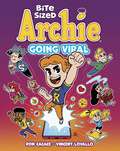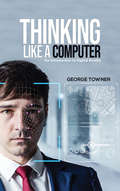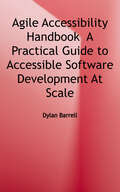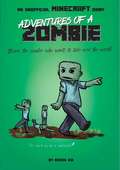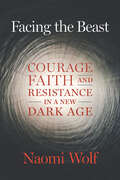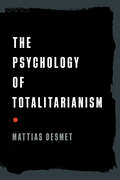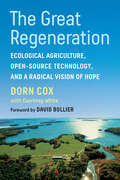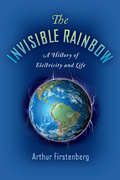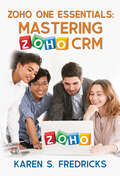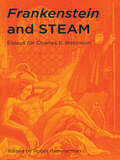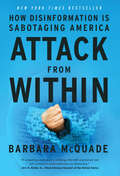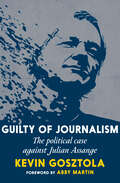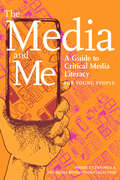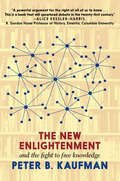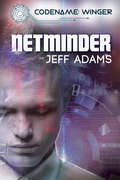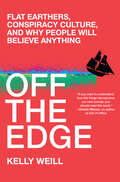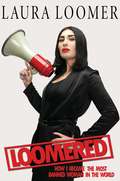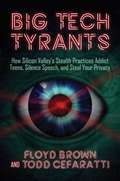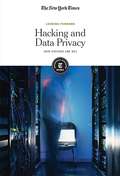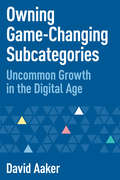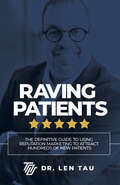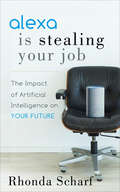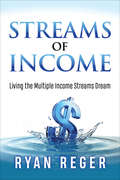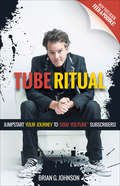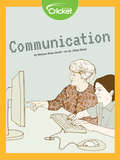- Table View
- List View
Bite Sized Archie: Going Viral (Archie Graphic Novels #2)
by Ron CacaceJust when you thought it was safe to go back on the internet... Why would you ever think that? At least Bite Sized Archie is back in print to take your mind away from that madness.Bite Sized Archie returns in the second collection of the thought-provoking (sure, why not) and satirical (most definitely) webcomic! The gang from Riverdale go way past meta and right into real as they tackle the world of today in their weekly strips. Both charming and sardonic, these comics reflect all the little things in life, pop culture and beyond. Packed with behind-the-scenes content from the creative team, you can't miss this sequel compilation!
Thinking Like a Computer: An Introduction to Digital Reality
by George TownerThinking Like a Computer is the result of a detailed 30-year study of how computers imitate life.Although they are machines, computers are designed to act like human beings. Software is specifically created to help accomplish human-like tasks and to be understood in human terms. Yet unlike human life, computer operations can be analyzed in detail because we build the machines that accomplish them and we know the design decisions that make them work.With every choice made during the evolution of digital technology, computer architects have intuitively or consciously incorporated truths of human functioning into their designs.Thinking Like a Computer is based on these truths, assembling them into a new explanation of human knowledge. In addition, it provides insights into the foundations of theoretical science because much of digital technology is dedicated to creating new realities.
Agile Accessibility Handbook: A Practical Guide to Accessible Software Development at Scale
by Dylan BarrellIt is estimated that one in five people has a disability; if you do the math, that's a huge, addressable market that is often overlooked. Digital Accessibility practitioners tap into this market by making digital documents-as well as web and mobile apps-accessible to everyone. However, many enterprises struggle to create, maintain, and scale their digital accessibility efforts. Agile Accessibility Handbook outlines the steps organizations can take to capture this market, avoid risk, maintain agility, and close the accessibility gap. Using the information provided within this handbook, accessibility subject matter experts, development team members, and executives in charge of setting priorities can together learn how to build successful accessibility experiences for everyone.
Adventures of a Zombie: An Unofficial Minecraft Diary (Minecraft #3)
by Books KidFollow the adventures of Bern the Zombie, the leader of the greatest zombie army in Minecraftian history, in this humorous, illustrated chapter book diary.It has taken years of determination, but finally the Bern the Zombie has assembled the largest army of zombies that Minecraftia has ever seen. What exactly does Bern plan to do with his army? Take over the Overworld, of course! But Bern is the first to admit that most zombies aren&’t terribly bright. For instance, they have trouble with basic things, like knowing their left from their right. Read every hilarious misstep of Bern&’s quest in Adventures of a Zombie, an unofficial Minecraft chapter book diary with black-and-white illustrations.
Facing the Beast: Courage, Faith, and Resistance in a New Dark Age
by Naomi WolfFrom New York Times bestselling author Naomi Wolf, Facing the Beast is a devastating, detailed account of wrongthink, deplatforming, and an unexpected political, personal, and spiritual transformation that followed during one of the most divisive times in American history. In this uncompromising investigation into today’s most urgent issues, Naomi Wolf uses her own wildly politicized pilgrimage—from New York Times bestselling author and high-level Democratic consultant to a journalist cast out from the elite political and social circles she once moved through—as a stunning narrative framework that is both chilling and incisive. Wolf’s sin? Doing the job that good journalists once prided themselves on: asking questions, challenging authority, and, during one of the most politically divisive moments in modern history, exposing the many failures of the public health response during the COVID-19 pandemic by chronicling the dangerous descent of our democracy into tyranny, censorship, and totalitarianism. Unable to remain silent in the shadows and unwilling to collude with the mainstream, Wolf bravely covers topics that few other writers dare to address critically for fear of being deplatformed. Facing the Beast explores reproductive rights, medical freedom, the uncurious thought-policing of the “progressive” left, the Second Amendment, the criminal relationship between the FDA and Pfizer—Wolf’s clear writing repeatedly shines light in the dark corners of our fractured society. A decades-long champion of free speech, freedom of the press, and the Constitution, Wolf found herself not only in the midst of a political rebirth but a spiritual transformation as well—one in which the events of the day could only be described in terms of good, evil, and a metaphysical quest on the nature of reality. For readers of Matt Taibbi, Glenn Greenwald, and Bari Weiss, Facing the Beast is a fearless indictment of legacy media and the political class, as well as a brutal reminder that searching for and defending the truth can be dangerous. “Naomi Wolf is one of the bravest, clearest-thinking people I know. The reason you hear the forces of repression so desperately trying to dismiss her is because she is right.”—Tucker Carlson
The Psychology of Totalitarianism
by Mattias DesmetThe world is in the grips of mass formation—a dangerous, collective type of hypnosis—as we bear witness to loneliness, free-floating anxiety, and fear giving way to censorship, loss of privacy, and surrendered freedoms. It is all spurred by a singular, focused crisis narrative that forbids dissident views and relies on destructive groupthink. Desmet’s work on mass formation theory was brought to the world’s attention on The Joe Rogan Experience and in major alternative news outlets around the globe. Read this book to get beyond the sound bites! Totalitarianism is not a coincidence and does not form in a vacuum. It arises from a collective psychosis that has followed a predictable script throughout history, its formation gaining strength and speed with each generation—from the Jacobins to the Nazis and Stalinists—as technology advances. Governments, mass media, and other mechanized forces use fear, loneliness, and isolation to demoralize populations and exert control, persuading large groups of people to act against their own interests, always with destructive results. In The Psychology of Totalitarianism, world-renowned Professor of Clinical Psychology Mattias Desmet deconstructs the societal conditions that allow this collective psychosis to take hold. By looking at our current situation and identifying the phenomenon of “mass formation”—a type of collective hypnosis—he clearly illustrates how close we are to surrendering to totalitarian regimes. With detailed analyses, examples, and results from years of research, Desmet lays out the steps that lead toward mass formation, including: An overall sense of loneliness and lack of social connections and bonds A lack of meaning—unsatisfying “bullsh*t jobs” that don’t offer purpose Free-floating anxiety and discontent that arise from loneliness and lack of meaning Manifestation of frustration and aggression from anxiety Emergence of a consistent narrative from government officials, mass media, etc., that exploits and channels frustration and anxiety In addition to clear psychological analysis—and building on Hannah Arendt’s essential work on totalitarianism, The Origins of Totalitarianism—Desmet offers a sharp critique of the cultural “groupthink” that existed prior to the pandemic and advanced during the COVID crisis. He cautions against the dangers of our current societal landscape, media consumption, and reliance on manipulative technologies and then offers simple solutions—both individual and collective—to prevent the willing sacrifice of our freedoms. “We can honor the right to freedom of expression and the right to self-determination without feeling threatened by each other,” Desmet writes. “But there is a point where we must stop losing ourselves in the crowd to experience meaning and connection. That is the point where the winter of totalitarianism gives way to a spring of life.” “Desmet has an . . . important take on everything that’s happening in the world right now.”—Aubrey Marcus, podcast host “[Desmet] is waking a lot of people up to the dangerous place we are now with a brilliant distillation of how we ended up here.”—Robert F. Kennedy, Jr.
The Great Regeneration: Ecological Agriculture, Open-Source Technology, and a Radical Vision of Hope
by Dorn CoxIn the age of climate change, food scarcity, and increasing industrialization, can a few visionary farmers find global solutions through technology and create networked, open-source regenerative agriculture at a truly transformative scale? In The Great Regeneration, farmer-technologist Dorn Cox and author-activist Courtney White explore unique, groundbreaking research aimed at reclaiming the space where science and agriculture meet as a shared human endeavor. By employing the same tools used to visualize and identify the global instability in our climate and our communities—such as satellite imagery—they identify ways to accelerate regenerative solutions beyond the individual farm. The Great Regeneration also explores the critical function that open-source tech can have in promoting healthy agroecological systems, through data-sharing and networking. If these systems are brought together, there is potential to revolutionize how we manage food production around the world, decentralizing and deindustrializing the structures and governance that have long dominated the agricultural landscape, and embrace the principles of regenerative agriculture with democratized, open-source technology, disseminating high-quality information, not just to farmers and ranchers, but to all of us as we take on the role of ecosystem stewards. In this important book, the authors present a simple choice: we can allow ourselves to be dominated by new technology, or we can harness its potential and use it to understand and improve our shared environment. The solutions we need now, they write, involve a broader public narrative about our relationship to science, to each other, and to our institutions. And we all need to understand that the choices made today will affect the generations to come. The Great Regeneration shows how, together, we can create positive and lasting change.
The Invisible Rainbow: A History of Electricity and Life
by Arthur FirstenbergElectricity has shaped the modern world. But how has it affected our health and environment? Over the last 220 years, society has evolved a universal belief that electricity is ‘safe’ for humanity and the planet. Scientist and journalist Arthur Firstenberg disrupts this conviction by telling the story of electricity in a way it has never been told before—from an environmental point of view—by detailing the effects that this fundamental societal building block has had on our health and our planet. In The Invisible Rainbow, Firstenberg traces the history of electricity from the early eighteenth century to the present, making a compelling case that many environmental problems, as well as the major diseases of industrialized civilization—heart disease, diabetes, and cancer—are related to electrical pollution.
Zoho One Essentials: Mastering Zoho CRM
by Karen S. FredricksReap the competitive benefits of Zoho, one of the best customer relationship management (CRM) solutions on the market today.Learn How To:>Store complete contact information, including name, company, phone numbers, mailing addresses, and e-mail addresses.>Record dated notes for each of your contacts so that you can easily keep track of meaningful conversations and activities. This feature is handy for those of us who forget things on occasion.>Keep a calendar that is cross-referenced with the appropriate contact so that you have a complete record of all interactions that you’ve had—or will have—with a contact.>Access reports and dashboards so that you can glean insight into your business based on the information in your database.>Merge your contact information into templates you create for marketing campaigns and other purposes. You can send those merged documents via snail mail, fax, or e-mail.>Manage your sales pipeline with built-in forecasting tools.What Is Customer Relationship Management (CRM)?CRM stands for customer relationship management and typically refers to software, like Zoho, that helps you manage your customer relationships. From a sales perspective, it means things like inputting and tracking leads, checking up on those leads, converting leads to contacts, and ultimately to deals. From a management perspective, you can track the progress of your sales team, create and run reports, and gather insights into your sale cycles and forecasts. Simply stated, the goal of a capable CRM product, such as Zoho, is to run your business efficiently, effectively and to increase profitability.Contents:What in the World is Zoho?Working with Contact RecordsWorking with Contact RecordsFind And Change RecordsStay in TouchHave it Your Way (set up the system)Managing UsersE-mail BlastsPipelines and DealsManaging ProductsProjectsCasesReports and DashboardsHacks and ShortcutsAbout the Author:A full-time consultant and trainer since the 1980s, Karen Fredricks is the author of thirteen books on CRM and Contact Management Software, including eleven “For Dummies” titles. Her work includes titles on ACT, Outlook, SugarCRM, Outlook Business Contact Manager, and Microsoft Office Live. She created training videos on Outlook and ACT! for LinkedIn Learning. A true CRM fanatic, she is the Virtual CRM Users Group founder and holds frequent webinars focusing on CRM usage.Karen’s company, Tech Benders, provides consulting, support, and training services for a variety of CRM products. Her focus is on making companies more efficient and productive—and therefore more profitable. She has worked with numerous Fortune 500 companies and other well-known entities, including the PGA, the ATP, FPL, and Volvo of North America.
Frankenstein and STEAM: Essays for Charles E. Robinson
by Susan J. Wolfson Mark A. McCutcheon Lisa Crafton Siobhan Watters Lisbeth Chapin L. Adam Mekler Brian Bates Robin HammermanCharles E. Robinson, Professor Emeritus of English at The University of Delaware, definitively transformed study of the novel Frankenstein with his foundational volume The Frankenstein Notebooks and, in nineteenth century studies more broadly, brought heightened attention to the nuances of writing and editing. Frankenstein and STEAM consolidates the generative legacy of his later work on the novel's broad relation to topics in science, technology, engineering, arts, and mathematics (STEAM). Seven chapters written by leading and emerging scholars pay homage to Robinson's later perspectives of the novel and a concluding postscript contains remembrances by his colleagues and students. This volume not only makes explicit the question of what it means to be human, a question Robinson invited students and colleagues to examine throughout his career, but it also illustrates the depth of the field and diversity of those who have been inspired by Robinson's work. Frankenstein and STEAM offers direction for continuing scholarship on the intersections of literature, science, and technology. Published by the University of Delaware Press. Distributed worldwide by Rutgers University Press.
Attack from Within: How Disinformation Is Sabotaging America
by Barbara McQuadeA NEW YORK TIMES BESTSELLERAn urgent, comprehensive explanation of the ways disinformation is impacting democracy, and practical solutions that can be pursued to strengthen the public, media, and truth-based politicsMSNBC's legal expert breaks down the ways disinformation has become a tool to drive voters to extremes, disempower our legal structures, and consolidate power in the hands of the few."One of the most acute observers of our time shares . . . a compelling work about a challenge that—left unexamined and left unchecked—could undermine our democracy." —Eric H. Holder Jr, 82nd Attorney General of the United StatesAmerican society is more polarized than ever before. We are strategically being pushed apart by disinformation—the deliberate spreading of lies disguised as truth—and it comes at us from all sides: opportunists on the far right, Russian misinformed social media influencers, among others. It's endangering our democracy and causing havoc in our electoral system, schools, hospitals, workplaces, and in our Capitol. Advances in technology including rapid developments in artificial intelligence threaten to make the problems even worse by amplifying false claims and manufacturing credibility.In Attack from Within, legal scholar and analyst Barbara McQuade, shows us how to identify the ways disinformation is seeping into all facets of our society and how we can fight against it. The book includes: The authoritarian playbook: a brief history of disinformation from Mussolini and Hitler to Bolsonaro and Trump, chronicles the ways in which authoritarians have used disinformation to seize and retain power.Disinformation tactics—like demonizing the other, seducing with nostalgia, silencing critics, muzzling the media, condemning the courts; stoking violence—and reasons why they work.An explanation of why America is particularly vulnerable to disinformation and how it exploits our First Amendment Freedoms, sparks threats and violence, and destabilizes social structures.Real, accessible solutions for countering disinformation and maintaining the rule of law such as making domestic terrorism a federal crime, increasing media literacy in schools, criminalizing doxxing, and much more.Disinformation is designed to evoke a strong emotional response to push us toward more extreme views, unable to find common ground with others. The false claims that led to the breathtaking attack on our Capitol in 2021 may have been only a dress rehearsal. Attack from Within shows us how to prevent it from happening again, thus preserving our country&’s hard-won democracy.
Guilty of Journalism: The Political Case against Julian Assange
by Kevin GosztolaFrom an acclaimed independent journalist, this carefully-documented analysis of the government&’s case against Julian Assange and its implications for press freedom acts as a crucial, compelling guidebook to Assange&’s upcoming trial.The legal action against Julian Assange is poised to culminate in a trial in the United States in 2023, and this book will help the public understand the proceedings. The establishment media's coverage of WikiLeaks founder Julian Assange's extradition case has focused on his deteriorating health and what CBS News called his &“secret family,&” but most of this coverage failed to detail the complex issues at stake against Assange. Guilty of Journalism outlines how WikiLeaks exposed the reality of American wars, the United States government&’s unprecedented indictment against Assange as a publisher, and the media&’s role in persuading the public to &“shoot the messenger.&”This new book by Kevin Gosztola, who has spent the last decade covering Assange, WikiLeaks, and the wider war on whistleblowers, tells the full story based on testimony from dozens of witnesses. It examines abuses of power by the CIA and the FBI, including a spying operation that targeted Assange&’s family, lawyers, and doctors. Guilty of Journalism offers a balanced and comprehensive perspective on all the events leading up to what press freedom advocates have called the trial of the century.Guilty of Journalism is a joint production of The Censored Press and Seven Stories Press.
The Media and Me: A Guide to Critical Media Literacy for Young People
by Ben Boyington Allison T. Butler Nolan Higdon Mickey Huff Andy Lee RothFrom foundations in critical thinking skills to practical tools and real-life perspectives, this book empowers young adult readers to be independent media users.During the recent presidential election, &“media literacy&” became a buzzword that signified the threat media manipulation posed to democratic processes. Meanwhile, statistical research has shown that 8 to 18 year-olds pack more than eleven hours with some form of media into each day by &“media multitasking.&” Young people are not only eager and interested to learn about and discuss the realities of media ownership, production, and distribution, they also deserve to understand differential power structures in how media influences our culture.The Media and Me provides readers with the tools and perspectives to be empowered and autonomous media users. The book explores critical inquiry skills to help young people form a multidimensional comprehension of what they read and watch, opportunities to see others like them making change, and insight into their own identity projects. By covering topics like storytelling, building arguments and recognizing fallacies, surveillance and digital gatekeeping, advertising and consumerism, and global social problems through a critical media literacy lens, this book will help students evolve from passive consumers of media to engaged critics and creators.The Media and Me is a joint production of The Censored Press and Triangle Square Books for Young Readers.
The New Enlightenment and the Fight to Free Knowledge
by Peter B. KaufmanHow do we create a universe of truthful and verifiable information, available to everyone?In The New Enlightenment and the Fight to Free Knowledge, MIT Open Learning&’s Peter B. Kaufman describes the powerful forces that have purposely crippled our efforts to share knowledge widely and freely.Popes and their inquisitors, emperors and their hangmen, commissars and their secret police—throughout history, all have sought to stanch the free flow of information. Kaufman writes of times when the Bible could not be translated—you&’d be burned for trying; when dictionaries and encyclopedias were forbidden; when literature and science and history books were trashed and pulped—sometimes along with their authors; and when efforts to develop public television and radio networks were quashed by private industry.In the 21st century, the enemies of free thought have taken on new and different guises—giant corporate behemoths, sprawling national security agencies, gutted regulatory commissions. Bereft of any real moral compass or sense of social responsibility, their work to surveil and control us are no less nefarious than their 16th- and 18th- and 20th- century predecessors. They are all part of what Kaufman calls the Monsterverse.The New Enlightenment and the Fight to Free Knowledge maps out the opportunities to mobilize for the fight ahead of us. With the Internet and other means of media production and distribution—video especially—at hand, knowledge institutions like universities, libraries, museums, and archives have a special responsibility now to counter misinformation, disinformation, and fake news—and especially efforts to control the free flow of information. A film and video producer and former book publisher, Kaufman begins to draft a new social contract for our networked video age. He draws his inspiration from those who fought tooth and nail against earlier incarnations of the Monsterverse—including William Tyndale in the 16th century; Denis Diderot in the 18th; untold numbers of Soviet and Central and East European dissidents in the 20th—many of whom paid the ultimate price. Their successors? Advocates of free knowledge like Aaron Swartz, of free software like Richard Stallman, of an enlightened public television and radio network like James Killian, of a freer Internet like Tim Berners-Lee, of fuller rights and freedoms like Edward Snowden. All have been striving to secure for us a better world, marked by the right balance between state, society, and private gain. The concluding section of the book, its largest piece, builds on their work, drawing up a progressive agenda for how today&’s free thinkers can band together now to fight and win. With everything shut and everyone going online, The New Enlightenment and the Fight to Free Knowledge is a rousing call to action that expands the definition of what it means to be a citizen in the 21st century.
Netminder (Codename: Winger #4)
by Jeff AdamsCodename: Winger: Book FourFor teenage secret agent Theo Reese, summer brought one surprise after another, and now that he’s back at school, the shocks keep coming. The unthinkable has happened—enemies have breached Tactical Operational Support, forcing Theo and his parents to instigate the protocols they’ve put in place in case of a worst-case scenario. As Theo goes on the run and tries to stay ahead of those pursuing them, he realizes the TOS network is down… and he’s on his own.He soon discovers the renegade organization Blackbird is responsible. Theo's been targeted by an old nemesis, who will do whatever it takes to force his hand and obtain his help in taking global control of the internet. Theo must prevent the internet hijacking, and while he finds allies, they’re in the last place he expects….
Off the Edge: Flat Earthers, Conspiracy Culture, and Why People Will Believe Anything
by Kelly Weill&“A deep dive into the world of Flat Earth conspiracy theorists . . . that brilliantly reveals how people fall into illogical beliefs, reject reason, destroy relationships, and connect with a broad range of conspiracy theories in the social media age. Beautiful, probing, and often empathetic . . . An insightful, human look at what fuels conspiracy theories.&” —Science Since 2015, there has been a spectacular boom in a centuries-old delusion: that the earth is flat. More and more people believe that we all live on a pancake-shaped planet, capped by a solid dome and ringed by an impossible wall of ice. How? Why? In Off the Edge, journalist Kelly Weill draws a direct line from today&’s conspiratorial moment, brimming not just with Flat Earthers but also anti-vaxxers and QAnon followers, back to the early days of Flat Earth theory in the 1830s. We learn the natural impulses behind these beliefs: when faced with a complicated world out of our control, humans have always sought patterns to explain the inexplicable. This psychology doesn&’t change. But with the dawn of the twenty-first century, something else has shifted. Powered by Facebook and YouTube algorithms, the Flat Earth movement is growing. At once a definitive history of the movement and an essential look at its unbelievable present, Off the Edge introduces us to a cast of larger-than-life characters. We meet historical figures like the nineteenth-century grifter who first popularized the theory, as well as the many modern-day Flat Earthers Weill herself gets to know, from moms on vacation to determined creationists to neo-Nazi rappers. We discover what, and who, converts people to Flat Earth belief, and what happens inside the rabbit hole. And we even meet a man determined to fly into space in a homemade rocket-powered balloon—whose tragic death is as senseless and absurd as the theory he sets out to prove. In this incisive and powerful story about belief, Kelly Weill explores how we arrived at this moment of polarized realities and explains what needs to happen so that we might all return to the same spinning globe.
Loomered: How I Became the Most Banned Woman in the World
by Laura LoomerLaura Loomer is the most banned woman in the world.An investigative journalist, activist, and truth-teller who has earned many powerful enemies in Silicon Valley and the media, Loomer has been banned from Facebook, Twitter, Instagram, Uber, Lyft, Uber Eats, PayPal, Venmo, GoFundMe, Periscope, Medium, and TeeSpring…so far. Loomer works tirelessly for Americans banned from essential online services for having the wrong political opinions. In addition to filing lawsuits against the companies that have wrongfully ostracized and defamed her, she is running for Congress in Florida&’s 21st District. This is her story.
Big Tech Tyrants: How Silicon Valley's Stealth Practices Addict Teens, Silence Speech, and Steal Your Privacy
by Floyd Brown Todd CefarattiThey are driven without respect for the lives they are changing…“Boy Kings,” or Big Tech Tyrants, are considered the most powerful individuals in the world. They’re the autocratic aristocrats who run the tech giants in Silicon Valley, and if the labels are accurate, they suggest these social platform operators have gained a non-elected (or, should we say, a self-elected) authoritarian power. They wield it with more effectiveness and precision than any sitting government or military strategist. Big Tech Tyrants boast riches beyond emperors of old but act like juveniles who don’t want to grow up. They are modern-day robber barons. Big Tech Tyrants don’t know the meaning of privacy, when it comes to you. They try to make you believe they will give their products away for free as a service to society, when really, they are vacuuming your personal data. They use this data to discover your deepest secrets. Are you or your partner trying to get pregnant? Are you underwater financially? Are you having an extramarital affair? Do you have a tidy nest egg? Are you a Trump supporter? Are you a Bernie Sanders follower? Are you a Scientologist, Mormon, Christian, or Buddhist? Your personal data is extremely valuable to them—and they use it—and abuse. These tyrants knowingly addict users to make more money. Not only that, they also consider themselves the most enlightened the world has ever seen—so they know what’s best for you to see—from the news and information you read to the political candidates they think you should vote for. They censor news and only let you see what they want you to see. This is an eye-opening must read for anyone living in the twenty-first century!
Hacking and Data Privacy: How Exposed Are We? (Looking Forward)
by The New York Times Editorial StaffHackers can break into government websites, nuclear power plants, and the NSA. They can steal corporate secrets, top-secret security code, and credit card numbers. Through social media, they can plant ideas, manipulate public opinion, and influence elections. And there's precious little we can do to stop them. this book documents the dramatic increase in hacking and data mining incidents in recent years. The articles within it explore how these incidents affect world events, such as the United Kingdom's Brexit vote and the 2016 U.S. presidential election. Investigative articles reveal who is behind these incidents, why they happened, and how we can protect our data.
Owning Game-Changing Subcategories: Uncommon Growth in the Digital Age
by David AakerOwning Game-Changing Subcategories is about creating organizational growth in the digital age by creating and owning game-changing subcategories fueled by digital.Owning Game-Changing Subcategories outlines the path to finding, managing, and leveraging new subcategories. In the digital age, the path has been made wider, shorter, and more frequently traveled. Throughout Owning Game-Changing Subcategories, David Aaker discusses certain aspects of the digital age that alter this path, such as E-commerce providing fast, inexpensive market access bypassing the cost of gaining distribution into storefront retailers or creating personal sales teams and social media and websites enabling communication on steroids in comparison with traditional use of advertising or events. Growth is not only a success measure but also creates energy and opportunity for customers and employees. And such growth almost never occurs with “my brand is better than your brand” marketing. Owning Game-Changing Subcategories explores the only ways to grow a business (with rare exceptions) which is to:develop new “must haves” that define a game-changing subcategory that provides a new or markedly superior buying or use experience or brand relationship to a core customer base;become the exemplar brand that represents the subcategory and drives its visibility, positioning, and success; and create barriers to competitors that could include “must-have” associations and a basis of relationships that go beyond functional benefits.
Raving Patients: The Definitive Guide To Using Reputation Marketing To Attract Hundreds Of New Patients
by Len TauIn Raving Patients, Dr. Len Tau, a practicing dentist in Philadelphia and online reputation specialist, shares simple tips and best practices to become visible and demonstrate credibility online. Dental practices waste thousands of dollars and hundreds of hours trying to find new patients using methods that may have worked decades ago but no longer work today. Raving Patients teaches dentists how to get exponentially better marketing results for a fraction of the time and money using a simple combination of online and offline reputation marketing strategies that take only minutes to implement. The strategies within Raving Patients help dental practices rise up search engine results when patients in their area search for new dentists. Dr. Tau also presents proven methodologies that help dental practices stand out as the practice of choice in their area. This generates a steady flow of patients who are more likely to move forward with treatment recommendations than other dental marketing strategies.
Alexa Is Stealing Your Job: The Impact of Artificial Intelligence on Your Future
by Rhonda ScharfThis guided tour of how AI will impact the future of work explores the ways both companies and employees can adapt to the new normal. Artificial intelligence is taking over. Ask Alexa to call a client or confirm your schedule for the day and she does so immediately. Ask her a question, give her a command, or just share a joke together, and she becomes your new best employee—one who never makes a mistake or calls out sick. In other words, Alexa can nix the need for millions of front-line workers. As companies race to keep up with advances in AI, employees must race just to keep their job. Author and public speaker Rhonda Scharf shows readers how a willingness to adapt to the new normal keeps both businesses and their employees relevant in these changing times. Alexa Is Stealing Your Job reveals what the future entails by diving into the world of AI and exploring how it impacts lives, careers, and the future.
Streams of Income: Living the Multiple Income Streams Dream
by Ryan RegerStreams of Income is a guide to making the ideal day an everyday occurrence by building multiple streams of income. Multiple streams of income might sound nice, but is it actually possible? YES! Anyone can build a business that creates multiple streams to supplement income or maybe even provides a way to leave their current job. In Streams of Income, online business coach Ryan Reger unpacks the three main online business models and helps readers determine which one is the best fit for them. He also provides the resources readers need to take action and even goes into discovering the “why” for starting an online business. Whether the goal is to spend more time with family, be able to give more to important causes, or saving for kids’ college or retirement, Ryan gives readers the tools they need to reach their goals and live the multiple income streams dream.
Tube Ritual: Jumpstart Your Journey to 5000 YouTube Subscribers
by Brian G. JohnsonEverybody begins their YouTube journey from zero.You have to start with no videos, views, or subscribers. Furthermore, more than 400 minutes of content is uploaded to YouTube each minute. To say that it&’s challenging to grow a channel is an understatement! In fact, less than 3% of YouTube channels ever gain more than 10,000 subscribers. Yet, in a one-year period, Brian G Johnson gained 10,623 subscribers and drove over half a million video views. Truly beginning from zero. Brian had no previous YouTube success to draw from and had to learn the myriad of camera settings, editing options, and technical details that often become a roadblock. Furthermore, he did it in a small and competitive niche, the YouTube video marketing niche.How, you ask?By researching, testing, and tweaking various video growth methods over a one-year period in order to identify why the YouTube algorithm promotes one video over another. Ultimately, this led to the creation of a video ritual based on his findings—a series of actions according to a prescribed order. More than a mere guide, Tube Ritual is a one-year case study with the goal being to drive more views and convert more viewers into subscribers. For those already creating videos or who want to in the future, Tube Ritual contains detailed, step-by-step information that plain works. From Branding to thumbnails, video structure, YouTube SEO, video calls to action, playlist strategies, channel strategies and more, Tube Ritual leaves no stone unturned.
Communication
by Melissa Shaw-SmithRyan’s father is on a tour of duty with the National Guard. Everyone else in his family seems to have found ways to cope with his absence, but Ryan hasn’t! When his dad’s deployment is extended, Ryan has to find a way to stay in touch with him. A trip to the library may be just what he needs—both for communication with his dad, and finding his way to cope!
